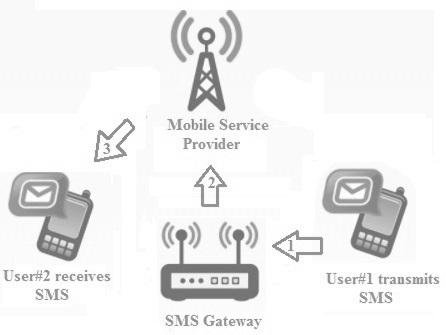5 Advantages and Disadvantages of SMS Communication
Advertisement
Introduction : Short Message Service (SMS) has been a cornerstone of mobile communication since the early 1990s, offering a quick, low‑bandwidth way to exchange brief text messages between devices almost anywhere in the world. Its ubiquity across all handset types, independence from data plans, and ability to reach users even on basic cellular networks make it a versatile tool for personal, commercial and emergency communications.
What is SMS?
- SMS stands for Short Message Service.
- It’s a non-realtime text messaging service, unlike voice calls which are realtime.
- Mobile phones provide a small message window where text messages can be typed and sent to one or multiple recipients.
- SMS messages are limited to a maximum of about 160 characters.
 Figure 1 depicts the working of the SMS system. It consists of four parts: sending mobile, SMS gateway, mobile service provider (i.e., cellular tower), and receiving mobile. The figure shows an SMS message traveling from user #1 to user #2.
Figure 1 depicts the working of the SMS system. It consists of four parts: sending mobile, SMS gateway, mobile service provider (i.e., cellular tower), and receiving mobile. The figure shows an SMS message traveling from user #1 to user #2.
Advantages of SMS Communication
Following are some of the benefits of SMS.
- Fast Communication: SMS is a quick way to reach someone.
- Message History: Communication history is automatically saved, allowing you to view old messages.
- Polite and Cost-Effective: It is a polite and inexpensive way to send information.
- Automated Notifications: SMS notifications can be automated.
- Message Storage: You can store SMS messages for as long as desired based on your phone’s settings and set message expiration as per your choice.
- Easy to Type: Typing is made easier with default words often suggested for comfortable input.
- Asynchronous Communication: You can leave a message even if the recipient is unavailable. This allows them to reply when they have a chance.
- Expressive Emojis: Smiley faces and other emoji icons are often included to help convey emotions.
Disadvantages of SMS Communication
Following are some of the drawbacks of SMS.
- Limited Message Size: SMS is limited to around 160 characters, which isn’t always enough to fully express a longer message. This might require sending multiple SMS messages.
- Unreliable Delivery: There’s no guarantee that an SMS will be delivered to its destination. Delivery can be delayed due to network congestion, or it may fail altogether due to memory issues, the recipient’s phone being busy, or being out of service. This makes it somewhat unreliable.
- No Read Receipts: You can’t tell if the recipient has actually read the SMS.
- DND Restrictions: Messages can’t be delivered to subscribers who have enabled “Do Not Disturb” (DND).
- Spam: Unwanted SMS messages are often broadcast for advertising purposes, which can be annoying.
Conclusion: SMS is most effective when speed, compatibility and minimal data requirements matter more than rich media features or advanced security. This makes it a complementary option in the wider ecosystem of digital communication tools.
Advertisement
 RF
RF






